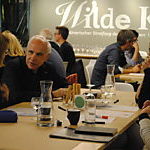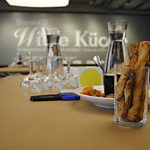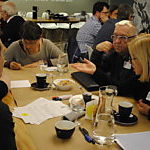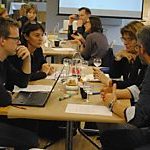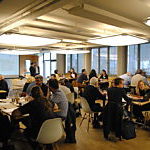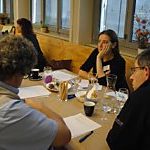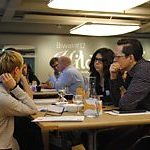The IEC «World Café»: Communication through group discussion
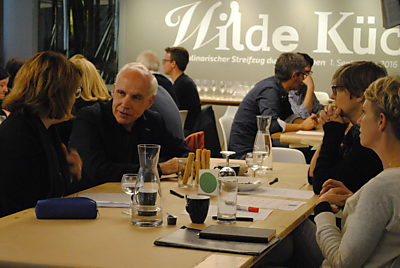 Group discussions at different tables Group discussions at different tables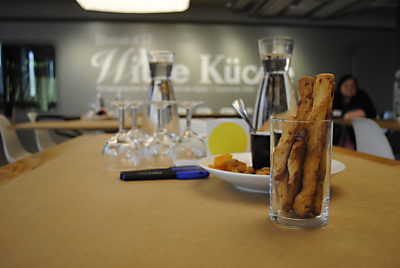 The las alps restaurant in the Swiss Alpine Museum The las alps restaurant in the Swiss Alpine Museum | The IEC sees its media and communications work as a process: research findings are important, but equally so are the means by which they are obtained. To better enable it to take the needs of its target groups into account in its communication efforts, the IEC seeks exchanges with those groups from the outset.
On the role of communications: Group discussion To that end, the IEC’s communications team organised a round of group discussions held in Bern on 24 October 2016 at the las alps restaurant in the Swiss Alpine Museum. The purpose of that first «World Café» was to reflect upon the role of the IEC’s media and communications work. The suggestions and ideas that grew out of those discussions will be integrated into the IEC’s further media and communications efforts. Invited to participate were representatives of the IEC’s various target groups (the media, the general public, concerned individuals, academic and political circles, education professionals, etc.). The participants were either people whose daily professional activities are concerned with the issue of administrative detention or individuals who had themselves been held in administrative detention.
«World Café»: Informal discussions with a precision landing At a World Café participants are seated in small groups at different tables.The freely formed groups discuss for a set amount of time a number of specific questions presented to them in advance. At the end of the discussions, the most important keywords, suggestions and questions are collected and written down. The varied composition of the discussion groups is intended to allow different perspectives on the issues to come together, in order stimulate dialogue on individual points of view and new ideas.
| |
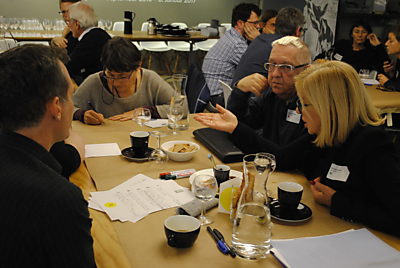 Group discussions at different tables Group discussions at different tables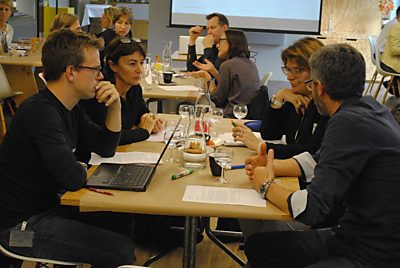 Group discussions at different tables Group discussions at different tables | Discussion rounds: Content of discussions The IEC World Café was moderated by Katharina Kilchenmann, a long-time editor and moderator at Radio SRF, today an editor with the newspaper «reformiert». Some 30 invited guests discussed the following subjects:
| |
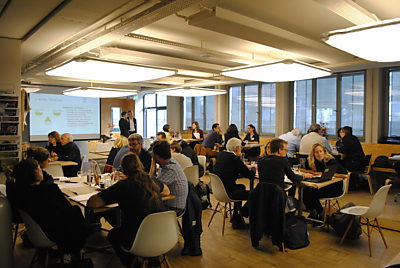 Final discussion round Final discussion round | Summation of results: A guideline for media and communications efforts: Each of the three rounds of discussions were conducted by seven groups sitting at different tables. At the end of each discussion, each group wrote down the five most important comments, suggestions and keywords on each of the three questions discussed. Presented in the form of a table they provide a kind of synopsis of the group discussions organised by the IEC. In the hope that these exchanges will be only the start of an ongoing dialogue, the synopsis of results represents an important fundament for the IEC’s future media and communications work. That work serves to illustrate that an historical subject can always be considered from different perspectives and act a catalyst for topical public debate. The discussions that took place at the World Café make it clear that the subject of administrative detention must, to the extent possible, be considered from a number of different angles simultaneously. A point often mentioned was the desirability of making the highly complex subject matter accessible to a wide audience without oversimplifying the issues and the role of the actors involved.
|
 next entry
next entry


